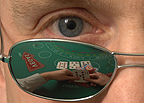December 05, 2007
Gambling study: "You gotta know when to fold 'em"

Caption follows story
Mark R. Dixon, director of the Gambling Intervention Program at Southern Illinois University Carbondale's Rehabilitation Institute, along with former graduate student Matthew D. Stieg took a close look at a handful of Texas Hold'em players before and after a local tournament in the winter of 2005. Their findings appeared in the Fall 2007 issue of the European Journal of Behavior Analysis.
Their work builds on studies Dixon and other colleagues conducted in 2002 and 2004 with an assessment tool he adapted from one used in research on drug and alcohol abuse to examine choice-making skills.
"We found then that given a battery of choices between having varying amounts of money now or at various later time periods, pathological gamblers will take smaller amounts of money now, rather than waiting for larger amounts of money," Dixon said.
"Recreational gamblers will want to wait (for the larger sums) and can wait longer periods of time. Clinicians have seen this kind of impulsive, poor choice making (in pathological gamblers) for years; this kind of demonstrable, quantifiable result underscores their claims."
In the earlier research, Dixon and his colleagues also found the setting affects choices these gamblers make: Put them in a casino, and they become even more impulsive than they are in a friendly poker game with the guys.
In this study (and in a larger one along the same lines conducted early last year), Dixon and Stieg focused on gamblers already identified as compulsive, both to test the lure of the immediate reward and to see if gamblers, like substance abusers, discounted the results of their choices once they'd made them.
Both this study and the larger one (now being written up in preparation for journal submission) bore out the earlier pattern, with an interesting twist. If the gamblers played with more than $10, the amount they'd settle for and the amount of time they could wait were each lower than they were for those gamblers who played with less than $10.
"(The high-stakes gamblers) are more impulsive and make worse choices," Dixon said. "These patterns were very similar before and after the tournament."
The data curves for responses to future rewards resemble those reporting the players' reflections on the past — including the differences between the high- and low-stakes gamblers.
"These guys tend to make rash, impulsive choices that wind up costing them money and causing economic and psychological distress, yet when they have the opportunity to examine the past and the choices they would make if they could 'go back in time,' they don't want to say they made mistakes," Dixon said.
"This is of interest both conceptually and clinically. We can use this information to guide treatment research and in the treatment itself, because here at SIU, we do both. We have had very impressive success rates — much greater than traditional treatment — because we base our therapy on data. We see results in our research and can implement those findings immediately."
Still, the raging popularity of Texas Hold'em — "You have poker tournaments on ESPN, a sports network, and you can buy home versions of the game at Macy's as a Christmas gift," Dixon noted — causes him some concern.
"We have two growing demographics for pathological gambling: the old people with the disposable income and kids," Dixon said.
"The pathological rate for kids is almost double that of the adults."
Dixon doesn't buy the notion that compulsive gambling has a genetic basis.
"The number of pathological gamblers has tripled in the past 20 years," he pointed out. "If it's inborn, that means we have undergone substantial genetic mutations in just two decades."
Instead, he looks to American culture as the source.
"We no longer see gambling as taboo — it can be done as a sport — and we have increasing opportunities for gambling," Dixon said.
"Twenty years ago, only two states had legalized gambling; now, 48 do. If you want a reason for the increase in pathological gambling, I'd put my money on the environment," he said with a smile.
Caption:
A watchful eye — Mark R. Dixon shows his hand as he scans his cards in the gambling laboratory at Southern Illinois University Carbondale. Dixon, director of the Gambling Intervention Program within SIUC's Rehabilitation Institute, has just published his latest research on Texas Hold'em, the world's most popular poker game.
Photo by Steve Buhman
